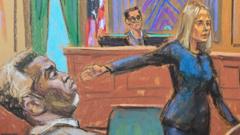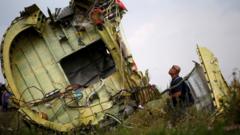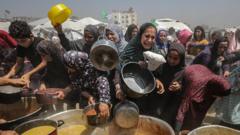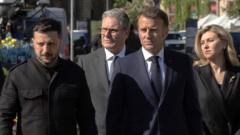While filming in the northern Jordan Valley, a BBC team finds themselves at odds with sanctioned settler Moshe Sharvit, who is accused of violent intimidation against local Palestinians. The confrontation highlights the stark divide between settlers advocating for Israeli expansion and activists seeking peaceful coexistence.
Confrontation in the Jordan Valley: BBC Team Encounters Sanctioned Israeli Settler
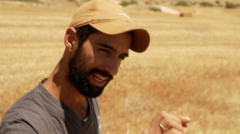
Confrontation in the Jordan Valley: BBC Team Encounters Sanctioned Israeli Settler
A tense encounter unfolds as a BBC team documents the conflicting realities of Israeli settlers and Palestinian shepherds in the occupied West Bank.
Dust hung in the air of the hot midday sun as a white jeep approached our filming location in the Jordan Valley. "I think it's Moshe Sharvit," said Gil Alexander, a 72-year-old devout religious Jew dedicated to protecting Palestinian shepherds from settler violence. The BBC team has been documenting Alexander’s efforts to offer support to local families within Israel-occupied territories.
Sharvit, previously sanctioned by the UK and the EU for his aggressive actions against Palestinians—including threats with a firearm—was the very figure whom the team was preparing to confront. A Palestinian grandmother had alleged last year that Sharvit forced her to abandon her family home, brandishing a gun during the intimidation. "What have I ever done to him?" she lamented, recalling how her family's struggles began after Sharvit established an illegal settlement nearby.
As the jeep pulled up, Sharvit approached, calling Alexander "a very dangerous guy." He recognized the BBC crew and made disparaging remarks about them and their intentions. Sharvit proceeded to alert the police, asserting that the journalists were harmful to Israel. The tension escalated as he filmed us filming him, demonstrating the charged atmosphere surrounding the Israeli-Palestinian conflict.
Representing opposing visions for Israel's future, Sharvit views the entire West Bank as divinely designated for Jews, a belief echoed by far-right political leaders in Israel. In contrast, Alexander—a self-identified Zionist—advocates for peaceful coexistence within pre-1967 borders. This ideological chasm was starkly illustrated as Sharvit blocked access to the road and continued his phone call to law enforcement.
During a brief moment of introspection, I asked Sharvit to agree to an interview, and surprisingly, he consented. What followed were claims of righteous protection over land, dismissing the fears of the local Palestinians as exaggerated tales. His rhetoric implied an outlook of aggression towards Palestinians, threatening that they were unknowingly pushing for severe repercussions.
Despite Sharvit's coercive presence, we decided to shift our attention and leave the area. However, the encounter with Sharvit left a somber reminder of the escalating violence, especially captioned by a recent increase in settler attacks against Palestinians.
Afterward, we discovered that both Sharvit and Alexander faced legal actions stemming from their long-standing antagonism. While Sharvit received a restraining order forbidding him from approaching certain Palestinian families, Alexander faced charges arising from a prior incident with Sharvit.
The conversation veered toward Syrian refugees, with one local authority suggesting that Palestinians should leave Israel for neighboring Jordan. As violence surged post-Hamas attacks on Israel, the stark divide in political and social beliefs loomed larger among residents in the region.
Gil Alexander, burdened by loss, particularly the suicides of his two sons, channels his grief into humanitarian efforts, striving for a vision of productive engagement, which drastically contrasts the sentiment of settlers like Sharvit, who harbor distinct and aggressive intentions toward Palestinians.
In the days that followed, we were informed of ongoing harassment from Sharvit, revealing the tense reality faced by peace activists in the region. Although our encounter provided a glimpse into deeply-rooted animosities, it underscored the urgent need for dialogue and understanding between the parties, amidst a backdrop of escalating conflicts and human suffering.

